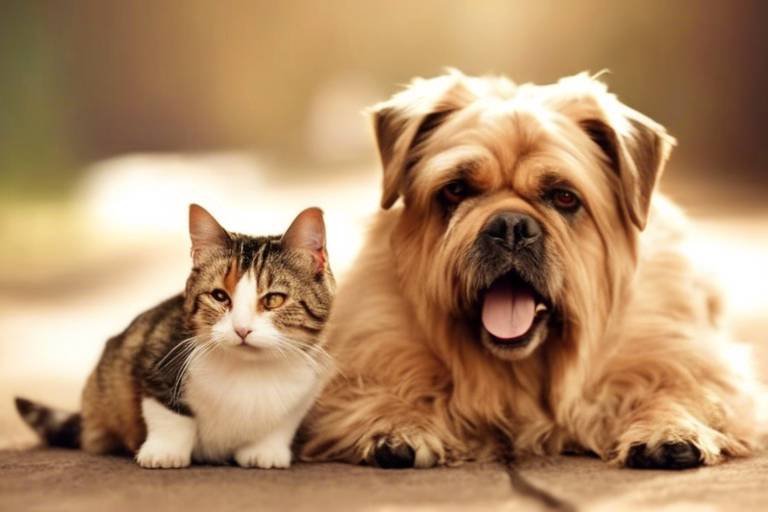The Best Natural Remedies for Senior Pet Health
As our furry companions age, it's not just their fur that turns gray; their health needs evolve, too. Just like how we might need reading glasses or a little extra care as we get older, our pets require special attention to ensure they live their golden years comfortably and happily. This article explores effective natural remedies that can enhance the health and well-being of senior pets, providing insights into holistic approaches for their care and longevity.
As pets age, their health requirements change significantly. Senior pets often face a variety of challenges, including joint issues, digestive problems, and decreased energy levels. Understanding these specific needs is crucial for pet owners who want to provide the best care possible. Natural remedies can play a vital role in addressing common health issues that aging pets face. For instance, incorporating certain herbs and supplements into their diet can help alleviate pain, improve mobility, and boost overall vitality. Just like a warm blanket on a chilly night, these remedies can provide comfort and enhance the quality of life for our beloved companions.
Joint issues are prevalent in senior pets, often leading to discomfort and reduced mobility. This is where herbal supplements come into play. They can help alleviate pain and improve joint function, ensuring that our pets can enjoy their favorite activities, like chasing after that elusive squirrel or taking leisurely strolls in the park. Some popular herbal supplements include turmeric, glucosamine, and chondroitin, each offering unique benefits for joint health.
Turmeric is a powerhouse when it comes to natural remedies, renowned for its potent anti-inflammatory properties. This golden spice can be safely incorporated into your senior pet's diet to support joint health and overall wellness. Think of turmeric as a natural shield that helps combat inflammation, much like a knight defending a castle. Adding turmeric to your pet's meals can help them feel more comfortable and active, allowing them to enjoy life to the fullest.
Proper dosage is crucial when administering turmeric. Too little may not yield the desired effects, while too much could lead to unwanted side effects. As a general guideline, you can start with a small amount, such as 1/4 teaspoon for small dogs and 1/2 teaspoon for larger breeds, and adjust based on your pet's size and health condition. Always consult with your veterinarian to tailor the dosage to your pet's specific needs.
While turmeric is generally safe for pets, some may experience side effects such as gastrointestinal upset. It's essential to monitor your pet's response when introducing any new supplement. If you notice any adverse reactions, such as vomiting or diarrhea, discontinue use and consult your veterinarian. Just like keeping an eye on a pot of boiling water, it’s vital to watch for any signs that something might be off.
Glucosamine and chondroitin are popular supplements often recommended for joint health in senior pets. These compounds work together to help rebuild cartilage and reduce inflammation, making them essential allies in managing arthritis. Think of them as the dynamic duo, working tirelessly to keep your pet's joints lubricated and functioning smoothly. Incorporating these supplements into your pet's routine can lead to noticeable improvements in their mobility and comfort levels.
Digestive issues can significantly affect senior pets, leading to discomfort and a decrease in their overall quality of life. Fortunately, there are several natural remedies that can aid digestion and promote gut health in aging animals. A healthy gut is crucial for nutrient absorption and overall wellness. Just like a well-tended garden, a balanced digestive system allows your pet to thrive.
Probiotics can work wonders by improving gut flora and digestion. These beneficial bacteria help maintain a healthy balance in your pet's digestive system, which is especially important as they age. When selecting probiotics for your senior pet, look for options specifically formulated for animals. These can enhance digestive health and may even help with issues like diarrhea or constipation.
A fiber-rich diet is essential for maintaining digestive health in senior pets. Fiber aids in digestion and helps regulate bowel movements. Some great natural sources of fiber include pumpkin, sweet potatoes, and green beans. Incorporating these foods into your pet's meals can make a world of difference, much like adding a splash of color to a black-and-white photo. A little extra fiber can help keep your pet feeling comfortable and satisfied.
- What are the best natural remedies for joint pain in senior pets?
Herbal supplements like turmeric, glucosamine, and chondroitin can be beneficial for joint health. - How can I improve my senior pet's digestion?
Incorporating probiotics and fiber-rich foods into their diet can enhance digestive health. - Is turmeric safe for pets?
Yes, turmeric is generally safe, but it's important to monitor for any side effects and consult your vet for proper dosage.

Understanding Senior Pet Needs
This article explores effective natural remedies that can enhance the health and well-being of senior pets, providing insights into holistic approaches for their care and longevity.
As our beloved pets age, their health requirements evolve significantly. Just like humans, senior pets experience various changes that can affect their quality of life. It’s essential to recognize these changes to provide the best care possible. Senior pets may face challenges such as reduced energy levels, joint stiffness, and digestive issues, which can all impact their overall well-being. Understanding these needs is the first step in ensuring they lead a comfortable and happy life.
One of the most noticeable changes in senior pets is their decreased mobility. You might notice your furry friend struggling to jump onto the couch or take their daily walks. This decline often stems from joint problems, such as arthritis, which is prevalent in older animals. Additionally, their metabolism slows down, making them more prone to weight gain, which can further exacerbate joint issues. It’s crucial to monitor their weight closely and adjust their diet accordingly.
Another critical aspect is their digestive health. Senior pets might experience a decline in digestive efficiency, leading to problems like constipation or diarrhea. A healthy gut is vital for nutrient absorption, and as pets age, they may require assistance in maintaining a balanced digestive system. Natural remedies can play a significant role in enhancing gut health, making it easier for our furry friends to enjoy their meals without discomfort.
Moreover, senior pets are often more susceptible to various health conditions, including dental disease, heart problems, and cognitive dysfunction. Regular veterinary check-ups are essential to catch any potential issues early. Alongside conventional treatments, integrating natural remedies can provide additional support for their health. For instance, incorporating herbal supplements and probiotics can be beneficial in managing these age-related conditions.
It’s also important to remember that emotional health is just as crucial as physical health. Senior pets may experience anxiety or depression, especially if their routine changes or they lose a companion. Providing a stable environment, along with plenty of love and attention, can help alleviate these feelings. Engaging them in gentle play or providing mental stimulation through interactive toys can keep their spirits high.
In summary, understanding the unique needs of senior pets is vital for their health and happiness. By recognizing the physical, digestive, and emotional changes they undergo, we can create a tailored care plan that includes natural remedies to enhance their quality of life. Remember, a holistic approach that combines love, attention, and natural health solutions can make a world of difference for your aging furry friends.
Joint issues are prevalent in senior pets. Here, we discuss herbal supplements that can help alleviate pain and improve mobility, ensuring a better quality of life for aging animals.
Turmeric is known for its anti-inflammatory properties. This subsection explains how turmeric can be safely incorporated into your senior pet's diet to support joint health and overall wellness.
Proper dosage is crucial when administering turmeric. This section provides guidelines on how much turmeric to give based on your pet's size and health condition.
While turmeric is generally safe, some pets may experience side effects. Here, we outline potential adverse reactions and how to monitor your pet's response.
These popular supplements are often recommended for joint health. This section discusses their benefits, how they work, and their role in managing arthritis in senior pets.
Digestive issues can affect senior pets significantly. This section highlights natural remedies that can aid digestion and promote gut health in aging animals.
Probiotics can improve gut flora and digestion. Here, we explore the types of probiotics suitable for senior pets and how they can enhance digestive health.
A fiber-rich diet is essential for maintaining digestive health. This subsection discusses the best natural sources of fiber and how to incorporate them into your pet's meals.
Q: What are the signs that my pet is aging?
A: Common signs include decreased energy, difficulty in mobility, changes in appetite, and behavioral changes. It's essential to monitor these signs closely.
Q: How can I improve my senior pet's joint health?
A: Incorporating natural remedies like turmeric, glucosamine, and chondroitin can help. Always consult your vet before starting any new supplements.
Q: What should I feed my senior pet?
A: A balanced diet rich in high-quality proteins, healthy fats, and fiber is crucial. Consult your vet for specific dietary recommendations based on your pet's health.
Q: How often should I take my senior pet to the vet?
A: Senior pets should ideally have check-ups every six months to catch any health issues early.

Herbal Supplements for Joint Health
As our beloved pets age, they often face a myriad of health challenges, and one of the most common issues is joint pain. Just like humans, senior pets can suffer from arthritis and other joint-related ailments that can significantly affect their quality of life. This is where herbal supplements come into play, providing a natural and effective way to support joint health and alleviate discomfort. Incorporating these remedies into your pet's routine can make a world of difference, allowing them to move more freely and enjoy their golden years to the fullest.
Among the most popular herbal supplements for joint health are turmeric, glucosamine, and chondroitin. These natural ingredients have been shown to possess remarkable anti-inflammatory properties and can help improve mobility in senior pets. But how exactly do these supplements work? Let’s dive deeper into each one:
Turmeric, a vibrant yellow spice, is often hailed for its powerful anti-inflammatory effects, thanks to its active compound, curcumin. This herb has been used for centuries in traditional medicine, and recent studies have shown that it can be beneficial for pets suffering from joint pain. By incorporating turmeric into your senior pet's diet, you can help reduce inflammation and discomfort, allowing them to regain some of their youthful energy.
When it comes to administering turmeric, dosage is key. It’s essential to tailor the amount based on your pet's size and specific health condition. Generally, a safe starting point is:
| Pet Size | Daily Turmeric Dosage |
|---|---|
| Small (up to 20 lbs) | 1/4 tsp |
| Medium (21-50 lbs) | 1/2 tsp |
| Large (51-100 lbs) | 1 tsp |
| X-Large (over 100 lbs) | 1-2 tsp |
Always consult your veterinarian before starting any new supplement regimen to ensure it aligns with your pet's individual health needs.
While turmeric is generally safe for pets, it’s important to be aware of potential side effects. Some pets may experience gastrointestinal upset, such as diarrhea or an upset stomach, especially if introduced too quickly. It’s advisable to start with a lower dosage and gradually increase it while monitoring your pet's response. If you notice any adverse reactions, discontinue use and consult your veterinarian.
Glucosamine and chondroitin are two other well-known supplements that can significantly benefit senior pets suffering from joint issues. These compounds work synergistically to help rebuild cartilage, reduce inflammation, and promote joint lubrication. Many veterinarians recommend these supplements for pets diagnosed with arthritis, as they can improve mobility and overall joint function.
When choosing glucosamine and chondroitin supplements, look for high-quality products that are specifically formulated for pets. The right combination can lead to noticeable improvements in your pet's activity levels and comfort, allowing them to enjoy life with less pain.
In summary, herbal supplements like turmeric, glucosamine, and chondroitin can be a game-changer for senior pets dealing with joint pain. By taking a holistic approach to their care, you can help enhance their quality of life and ensure they remain active and happy during their golden years.
1. Can I give my pet turmeric every day?
Yes, turmeric can be given daily, but it’s crucial to follow dosage guidelines and consult your veterinarian for personalized advice.
2. Are there any risks associated with glucosamine and chondroitin?
Generally, these supplements are safe for pets, but some may experience mild digestive upset. Always monitor your pet and consult your vet if you have concerns.
3. How long does it take to see results from these supplements?
Results can vary, but many pet owners report improvements within a few weeks of consistent use.
4. Can I use human supplements for my pet?
It’s best to use supplements specifically formulated for pets, as human products may contain ingredients that are harmful to animals.
Turmeric Benefits
When it comes to enhancing the health of our beloved senior pets, turmeric stands out as a powerhouse ingredient. This golden spice, often found in our kitchens, is not just for adding flavor to dishes; it's a natural remedy with incredible benefits for aging animals. The key component in turmeric is curcumin, known for its potent anti-inflammatory and antioxidant properties. As our pets grow older, they often face various health challenges, particularly related to joint pain and inflammation. Turmeric can be a game-changer in managing these issues.
One of the primary benefits of turmeric is its ability to reduce inflammation, which is a common problem in senior pets suffering from arthritis or other joint-related issues. By incorporating turmeric into their diet, you may notice a significant improvement in their mobility and overall comfort. Imagine your pet, once hesitant to jump onto the couch, now bounding with joy and energy! It's like turning back the clock, allowing them to enjoy their golden years with less discomfort.
In addition to its anti-inflammatory effects, turmeric also supports the immune system, aiding in the fight against various ailments that may afflict older pets. It helps in detoxifying the liver and promoting a healthy digestive system. The benefits of turmeric are not just limited to physical health; it can also enhance your pet's mood and vitality. Think of it as a natural boost to their overall well-being, making them feel more youthful and spirited.
Incorporating turmeric into your senior pet's diet can be done in several ways. You can sprinkle turmeric powder over their food, mix it into homemade treats, or even opt for turmeric-infused oils. However, it’s essential to combine turmeric with a source of fat, like coconut oil or olive oil, to enhance its absorption in the body. This is because curcumin is fat-soluble, meaning it binds well with fats, allowing your pet to reap the maximum benefits.
To summarize, here are some of the key benefits of turmeric for senior pets:
- Reduces inflammation: Helps alleviate joint pain and improve mobility.
- Boosts immune function: Supports overall health and resilience against diseases.
- Aids digestion: Promotes a healthy digestive tract and liver function.
- Enhances mood: Can contribute to a more energetic and happier pet.
As you consider adding turmeric to your senior pet's diet, remember to consult with your veterinarian, especially if your pet is on medication or has existing health conditions. This ensures that you’re making the safest and most beneficial choice for your furry friend.
Dosage Guidelines
When it comes to incorporating turmeric into your senior pet's diet, understanding the correct dosage is essential for ensuring their safety and maximizing the benefits. Just like with any supplement, the right amount can vary based on several factors, including your pet's size, weight, and overall health condition. Generally, a good rule of thumb is to start with a small dosage and gradually increase it while monitoring your pet's response.
For most senior pets, a dosage of 1/8 to 1/4 teaspoon of turmeric powder per 10 pounds of body weight is recommended. However, this can vary, so consulting with your veterinarian before starting any new supplement is always a wise idea. Here’s a quick reference table to help you determine the appropriate dosage based on your pet's weight:
| Weight of Pet | Recommended Dosage of Turmeric |
|---|---|
| Up to 10 lbs | 1/8 teaspoon |
| 11 to 20 lbs | 1/4 teaspoon |
| 21 to 30 lbs | 1/2 teaspoon |
| 31 to 40 lbs | 3/4 teaspoon |
| 41 lbs and above | 1 teaspoon |
It’s crucial to mix turmeric with a source of fat, such as coconut oil or fish oil, to enhance its absorption in the body. This combination not only helps your pet reap the full benefits of turmeric but also makes it more palatable. Remember, every pet is unique, and what works for one may not work for another. So, keep an eye on your furry friend’s reaction and adjust the dosage as needed, ensuring they are comfortable and healthy.
In addition to monitoring their response, it’s also important to maintain regular check-ups with your veterinarian, especially if your senior pet is already on medication or has existing health issues. Your vet can provide tailored advice and adjustments to the dosage based on your pet's specific needs. After all, just like humans, pets thrive on a personalized approach to their health!
Potential Side Effects
While turmeric is widely celebrated for its anti-inflammatory benefits and overall wellness support, it's essential to approach its use with caution, especially when it comes to our beloved senior pets. Just like us, pets can react differently to various substances, and turmeric is no exception. Some pets may experience mild side effects, which can vary based on their individual health conditions, size, and the dosage administered.
Common side effects of turmeric in pets may include:
- Gastrointestinal Upset: Some pets might experience stomach issues like diarrhea or vomiting, particularly if they consume too much turmeric at once.
- Allergic Reactions: Although rare, some pets may have an allergic reaction to turmeric, leading to symptoms such as itching, swelling, or difficulty breathing.
- Blood Thinning: Turmeric has natural blood-thinning properties, which can be problematic for pets on anticoagulant medications.
It's crucial to monitor your pet's behavior and health after introducing turmeric into their diet. Watch for any signs of discomfort or unusual behavior, such as lethargy or changes in appetite. If you notice any adverse reactions, it’s best to consult your veterinarian promptly. Your vet can help determine whether turmeric is suitable for your pet and may suggest alternative natural remedies if necessary.
Additionally, keep in mind that the quality of turmeric matters. Always opt for high-quality, organic turmeric products that are free from additives or fillers. This ensures that your pet receives the best possible benefits without unnecessary risks. In conclusion, while turmeric can be a fantastic addition to your senior pet's health regimen, being aware of potential side effects and monitoring your pet closely will help ensure a safe and beneficial experience.
Here are some common questions pet owners have regarding the use of turmeric and other natural remedies for their senior pets:
- Can I give my pet turmeric every day? Yes, many pet owners incorporate turmeric into their pets' diets daily, but it's important to consult with your veterinarian for personalized advice.
- What is the best way to give turmeric to my pet? Turmeric can be mixed with food, or you can create a paste with water and coconut oil. Always ensure it’s well-mixed to avoid any clumping.
- Are there any pets that should avoid turmeric? Pets with certain health conditions, especially those on blood-thinning medications, should avoid turmeric unless advised otherwise by a veterinarian.
Glucosamine and Chondroitin
As our furry friends age, their joints often become less forgiving, leading to discomfort and mobility issues. This is where glucosamine and chondroitin come into play. These two natural substances are commonly recommended for senior pets suffering from arthritis and joint pain. But what exactly are they, and how can they help your beloved companion?
Glucosamine is an amino sugar that plays a vital role in building cartilage, the tissue that cushions joints. It acts like a sponge, absorbing water and nutrients to keep joints lubricated and healthy. On the other hand, chondroitin is a complex carbohydrate that helps cartilage retain its elasticity and resist compression. Together, they form a powerhouse duo that can significantly improve your pet's quality of life.
When considering glucosamine and chondroitin for your senior pet, it's essential to understand how they work. These supplements not only provide relief from pain but also enhance joint function and mobility. Many pet owners report noticeable improvements in their pets' energy levels and overall happiness after incorporating these supplements into their diets. Imagine your once-sprightly pup bounding around again, chasing after their favorite ball or enjoying long walks at the park!
While glucosamine and chondroitin can be found in various forms, including powders, tablets, and chewable treats, it's crucial to choose high-quality products that are specifically formulated for pets. Look for supplements that contain the right concentrations of these ingredients and have been tested for safety and efficacy. Additionally, always consult your veterinarian before starting any new supplement regimen, as they can provide personalized recommendations based on your pet's individual health needs.
Many pet owners wonder about the dosage of glucosamine and chondroitin for their furry friends. Generally, the recommended dosage varies based on your pet's weight. Here’s a simple guideline:
| Pet Weight | Glucosamine Dosage | Chondroitin Dosage |
|---|---|---|
| Up to 20 lbs | 250 mg | 200 mg |
| 21-50 lbs | 500 mg | 400 mg |
| 51-100 lbs | 1000 mg | 800 mg |
| Over 100 lbs | 1500 mg | 1200 mg |
It's also important to monitor your pet after starting these supplements. While most pets tolerate glucosamine and chondroitin well, some may experience mild side effects, such as gastrointestinal upset or allergic reactions. Keep an eye out for any unusual behavior, and consult your veterinarian if you notice anything concerning.
In conclusion, glucosamine and chondroitin can be incredibly beneficial for senior pets struggling with joint issues. By providing essential nutrients that support joint health, these supplements can help restore mobility and improve overall well-being. So, if you want to see your furry friend bounce back to their playful self, consider integrating these natural remedies into their care routine. Your pet deserves to enjoy their golden years with comfort and joy!
- Can I give my pet human glucosamine and chondroitin supplements? It's best to use pet-specific formulations, as they are tailored to your pet's unique needs.
- How long does it take to see results? Many pet owners notice improvements within a few weeks, but it may take longer for some pets.
- Are there any risks associated with these supplements? While generally safe, some pets may experience side effects. Always consult your vet before starting any new supplement.

Natural Remedies for Digestive Health
As our beloved pets age, their digestive systems often become less efficient, leading to a variety of issues such as constipation, diarrhea, and general discomfort. It’s crucial to understand that a healthy gut is the cornerstone of overall well-being for senior pets. Fortunately, there are numerous natural remedies that can aid in maintaining and improving digestive health. By incorporating these remedies into your senior pet's diet, you can help them enjoy their golden years with a happier, more comfortable tummy.
One of the most effective natural remedies is the use of probiotics. These friendly bacteria play a vital role in enhancing gut flora and improving digestion. Just like us, pets benefit from a balanced microbiome, which can help prevent gastrointestinal issues. When selecting probiotics for your senior pet, look for products specifically formulated for animals, as they contain strains that are beneficial for their unique digestive systems. Many pet owners report noticeable improvements in their pets’ digestion and energy levels after introducing probiotics into their diet.
Another essential aspect of digestive health is fiber. A fiber-rich diet can work wonders for your pet's digestive system, helping to regulate bowel movements and prevent constipation. Foods high in fiber include pumpkin, sweet potatoes, and green beans. These not only provide the necessary fiber but also come packed with vitamins and minerals that support overall health. When adding fiber to your pet's meals, start gradually to allow their digestive system to adjust. This will help avoid any sudden changes that could cause discomfort.
To help you better understand the benefits of these natural remedies, here’s a quick comparison of probiotics and fiber:
| Aspect | Probiotics | Fiber |
|---|---|---|
| Function | Enhances gut flora and digestion | Regulates bowel movements and prevents constipation |
| Sources | Specialized pet supplements | Pumpkin, sweet potatoes, green beans |
| Benefits | Improves digestion, boosts immunity | Supports digestive health, promotes satiety |
In addition to probiotics and fiber, consider incorporating digestive enzymes into your pet's diet. These enzymes assist in breaking down food, making it easier for your senior pet to absorb nutrients. You can find digestive enzyme supplements specifically designed for pets, which can be particularly helpful for those with sensitive stomachs or who have trouble digesting certain foods.
Lastly, always ensure your senior pet has access to fresh water. Hydration is key to maintaining a healthy digestive system. Dehydration can lead to constipation and other digestive issues, so encourage your pet to drink plenty of water throughout the day.
Q: How can I tell if my senior pet has digestive issues?
A: Common signs include changes in appetite, vomiting, diarrhea, constipation, or excessive gas. If you notice any of these symptoms, consult your veterinarian.
Q: Can I give my pet human probiotics?
A: It’s best to use probiotics specifically formulated for pets, as they contain strains that are beneficial for animal digestion.
Q: How much fiber should I add to my pet's diet?
A: Start with a small amount, about 1-2 teaspoons for small pets and 1-2 tablespoons for larger dogs, and gradually increase as needed. Always consult with your vet for personalized advice.
Q: Are there any side effects to introducing new foods?
A: Yes, introducing new foods too quickly can cause digestive upset. Always introduce new foods gradually to allow your pet’s system to adjust.
Probiotics for Pets
This article explores effective natural remedies that can enhance the health and well-being of senior pets, providing insights into holistic approaches for their care and longevity.
As pets age, their health requirements change. This section delves into the specific needs of senior pets and how natural remedies can address common health issues they face.
Joint issues are prevalent in senior pets. Here, we discuss herbal supplements that can help alleviate pain and improve mobility, ensuring a better quality of life for aging animals.
Turmeric is known for its anti-inflammatory properties. This subsection explains how turmeric can be safely incorporated into your senior pet's diet to support joint health and overall wellness.
Proper dosage is crucial when administering turmeric. This section provides guidelines on how much turmeric to give based on your pet's size and health condition.
While turmeric is generally safe, some pets may experience side effects. Here, we outline potential adverse reactions and how to monitor your pet's response.
These popular supplements are often recommended for joint health. This section discusses their benefits, how they work, and their role in managing arthritis in senior pets.
Digestive issues can affect senior pets significantly. This section highlights natural remedies that can aid digestion and promote gut health in aging animals.
Probiotics are like tiny superheroes for your pet's gut! These beneficial bacteria can work wonders in improving gut flora and digestion, especially for our aging companions. As pets grow older, their digestive systems often become less efficient, leading to issues like constipation, diarrhea, or even bloating. By introducing probiotics into their diet, you can help restore balance to their gut microbiome, enhancing their overall digestive health.
There are various types of probiotics suitable for pets, including:
- Lactobacillus: This strain is known for its ability to help with diarrhea and is often found in yogurt.
- Bifidobacterium: Great for improving gut health and enhancing the immune system.
- Enterococcus: This strain can help reduce the risk of gastrointestinal issues in pets.
When selecting probiotics for your senior pet, always look for products specifically formulated for animals, as human probiotics may not be effective for them. Moreover, it's essential to consult your veterinarian before starting any new supplement to ensure it's appropriate for your pet's specific health needs.
Incorporating probiotics into your pet's diet can be as simple as adding a sprinkle of probiotic powder to their food or choosing high-quality pet foods that already contain these beneficial bacteria. Regular use can lead to noticeable improvements in your pet's digestion, energy levels, and overall health.
Q: How do I know if my pet needs probiotics?
A: If your pet experiences digestive issues, such as irregular bowel movements or excessive gas, it may benefit from probiotics. Always consult your vet for tailored advice.
Q: Can I give my pet human probiotics?
A: It's not recommended. Human probiotics may not provide the same benefits for pets and could even cause digestive upset. Always choose pet-specific products.
Q: Are there any side effects of probiotics for pets?
A: Probiotics are generally safe, but some pets may experience mild gastrointestinal upset initially. If symptoms persist, consult your veterinarian.
Fiber-Rich Diets
When it comes to maintaining the health of our senior pets, a fiber-rich diet plays a pivotal role. Just like us, our furry companions need a good balance of nutrients to keep their digestive systems running smoothly. As pets age, their metabolism slows down, and digestive issues can become more prevalent. This is where fiber steps in as a superhero! It helps regulate bowel movements, prevent constipation, and can even aid in weight management, which is crucial for senior pets who may not be as active as they once were.
So, what exactly is fiber? In simple terms, it’s the part of plant-based foods that our pets can’t digest. It might sound like a bad thing, but fiber is essential for promoting a healthy gut. It adds bulk to the diet and helps move food through the digestive tract. Think of it as a friendly broom sweeping everything along! There are two types of fiber: soluble and insoluble. Soluble fiber dissolves in water and can help lower cholesterol and regulate blood sugar levels, while insoluble fiber adds bulk to the stool and aids in digestion.
When considering a fiber-rich diet for your senior pet, it's important to choose the right sources. Here are some excellent options:
- Pumpkin: Not only is it a tasty treat, but pumpkin is also packed with fiber and can help regulate digestion.
- Sweet Potatoes: These are not just delicious; they are also a great source of dietary fiber and essential vitamins.
- Carrots: Crunchy and satisfying, carrots can be a fun snack that also contributes to fiber intake.
- Green Beans: These are low in calories and high in fiber, making them a perfect addition to your pet's meals.
Incorporating these fiber-rich foods into your pet's diet can be as simple as mixing them into their regular meals. However, it's important to introduce any new foods gradually to avoid upsetting their stomachs. Start with small amounts and observe how your pet reacts. If they seem to enjoy the new additions and their digestive health improves, you can gradually increase the portion sizes.
It's also crucial to ensure that your senior pet stays hydrated, especially when increasing their fiber intake. Water works hand in hand with fiber to help keep their digestive system moving smoothly. Always have fresh water available, and encourage your pet to drink more, especially if they are eating more fiber-rich foods.
In summary, a fiber-rich diet is essential for senior pets to maintain their digestive health. By choosing the right sources of fiber and introducing them slowly, you can help your furry friend feel their best as they age. Remember, a happy gut leads to a happy pet!
1. How much fiber should my senior pet have?
The amount of fiber can vary depending on your pet's size and specific health needs. Generally, a diet containing 2-5% fiber is recommended for senior pets. It's best to consult with your veterinarian for personalized advice.
2. Can too much fiber be harmful?
Yes, while fiber is beneficial, too much can lead to digestive upset, including diarrhea or bloating. Always increase fiber gradually and monitor your pet's response.
3. Are there any commercial dog foods that are high in fiber?
Absolutely! Many brands offer specialized senior dog foods that are formulated with higher fiber content. Look for options that list whole food sources of fiber like peas, carrots, or brown rice.
4. Can I give my pet fiber supplements?
Yes, fiber supplements can be beneficial, but it's essential to consult with your vet before introducing any supplements to your pet's diet.
Frequently Asked Questions
- What are the common health issues faced by senior pets?
As pets age, they often encounter a variety of health issues, including arthritis, digestive problems, and decreased mobility. These conditions can significantly affect their quality of life, making it essential to address their specific needs with appropriate care.
- How can natural remedies help my senior pet?
Natural remedies can enhance your senior pet's health by providing relief from common ailments. For instance, herbal supplements like turmeric can alleviate joint pain, while probiotics can improve digestive health. These holistic approaches can lead to a happier, healthier life for your furry friend.
- Is turmeric safe for my senior pet?
Yes, turmeric is generally safe for senior pets when given in appropriate doses. Its anti-inflammatory properties can support joint health and overall wellness. However, it's always best to consult with your veterinarian before adding any new supplement to your pet's diet.
- What dosage of turmeric should I give my pet?
The dosage of turmeric depends on your pet's size and health condition. A common guideline suggests starting with a small amount—about 1/4 teaspoon for small pets and up to 1 teaspoon for larger dogs. Always monitor your pet's response and adjust as needed.
- Can my pet have side effects from turmeric?
While turmeric is safe for most pets, some may experience mild side effects such as gastrointestinal upset. It's crucial to observe your pet after introducing turmeric and consult your vet if you notice any adverse reactions.
- What are glucosamine and chondroitin, and how do they help?
Glucosamine and chondroitin are popular supplements that support joint health in senior pets. They help maintain cartilage integrity and reduce inflammation, making them effective in managing arthritis and improving mobility.
- How do probiotics benefit my senior pet?
Probiotics are beneficial bacteria that promote a healthy gut flora. They can aid in digestion, enhance nutrient absorption, and boost your pet's immune system, making them a valuable addition to your senior pet's diet.
- What are the best sources of fiber for senior pets?
Fiber-rich diets are essential for digestive health in senior pets. Natural sources include pumpkin, sweet potatoes, and green beans. Incorporating these foods into your pet's meals can help maintain regular bowel movements and overall digestive function.



















